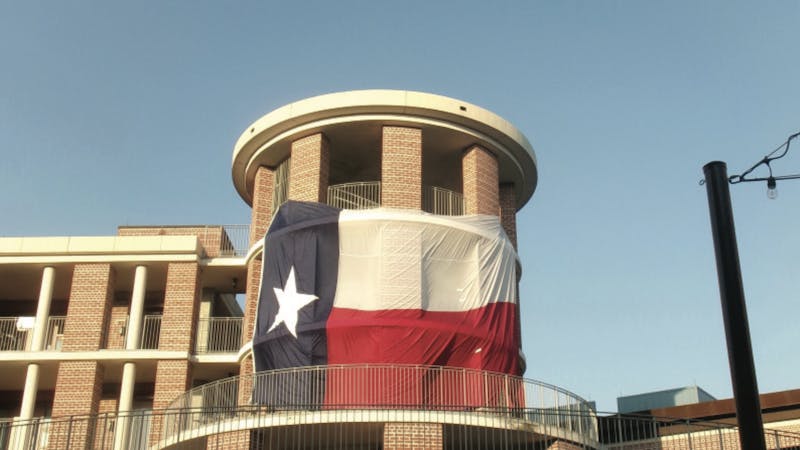Reduce, Reuse, Recycle Water
With the city of Houston in drought with lack of rainfall and experiencing record-breaking heat, Rice Facilities Planning and Engineering has a wide variety of water conservation projects and tips students can use to help save water on campus.
There has been a 65 percent spike in how much water has been used on campus between March and June 2011 compared to the same time period last year because of the drought, Director of Energy and Sustainability Richard Johnson said.
"One of the biggest – or really the biggest water-saving project at Rice is a collection of projects that collect water from air conditioning units," Johnson said.
FE&P has been working to conserve water by reusing the water that air conditioners produce. Many of the science buildings on campus — including the Biosciences Research Collaborative, Duncan College and McMurtry College — have pipes that take used chilled water produced by the air conditioners back to the South Plant located on campus where it is then transported to back to the science buildings and others, Facilities Project Manager Erik Knezevich said. This process saves energy by using the already cold water in the air conditioners, Johnson said.
"Once the BRC is fully established, we are estimating 12 to 14 million gallons will be saved per year," Knezevich noted.
That 12 to 14 million gallons will be about five to six percent of Rice's yearly water consumption, Johnson said.
One thing students can do to help save water and energy on campus is keep their air conditioning between 74 and 78 degrees Fahrenheit, Housing Operations Manager Mark Chaszar said.
After air conditioning, irrigation accounts for one third of the yearly water consumption campus, Johnson said.
"We are prioritizing watering certain areas," Johnson said. "Especially the historic live oaks that line the roads and some specimens of trees."
In addition to these trees, the most visible areas of lawn, according to Johnson, will be maintained, as well as the IM fields.
Other lawn areas have been chosen to be let go because they can be easily regrown, he said.
"You can replace lawn in a weekend," Johnson said. "It would take a century to replace a live oak [tree]."
Watering these lawns and trees has brought about some new water conservation efforts. Because of Houston's high water table, buildings with basements like Sewall Hall, McNair Parking Garage at the Jones school of business, the BRC and the stadium all have to pump water out to keep the basements from flooding, Johnson said. This water normally goes straight to the storm and sewer drains, but FE&P has found a way to redirect it with hoses and use the water to irrigate the academic quad and some plants.
"[Knezevich] is working on projects to make this process more permanent," Johnson said.
The water is not potable so it can only be used in certain ways such as watering lawns, he said.
In the same vein as focusing irrigation, Johnson said no new landscaping will be done since bringing in new plants requires even more water than maintaining the current landscaping.
Saving water is also being pursed at a more mirco level with all shower heads on campus being relaced with more water-efficent ones, Chaszar said.
The new shower heads use less water but, due to an air intake valve on the head, have higher pressure than the old shower heads, he said. The new shower heads were tested out at Hanszen last semester and Chaszar said he got nothing but good feedback. So far, only Lovett College and Hanszen College have been re-outfitted, though the rest will soon receive them, Chaszar said.
If students see any sign of a water line breakage or water wasting on campus, send an email to energywaste@rice.edu or go to the FE&P website http://sustainability.rice.edu/. Students can also submit ideas about how to conserve energy or water to the FE&P website.
More from The Rice Thresher
Rice lands high on Niche, Forbes college ranking lists
Rice recently ranked No. 10 on Niche’s Best Colleges in America list and No. 12 on Forbes’ annual America’s Top Colleges list in 2026. It was also recognized in several categories by the Princeton Review, placing in the top 10 in four categories.
From post-human novels to augmented reality, Rice hires new faculty
Rice welcomed 97 new professors this fall across disciplines, including a posthumanist Harvard scholar, a husband-wife duo and a computer science professor who graduated from Rice thrice.

First public of the year reckons with threats of a dry campus
After a Dis-O that saw four times as many calls for intoxication-related transports of students to the hospital compared to the prior three years, Cory Voskanian, a Martel College socials head tasked with planning the first public of the year, said that he was feeling the pressure.


Please note All comments are eligible for publication by The Rice Thresher.